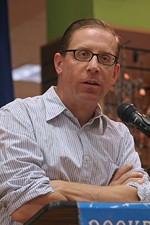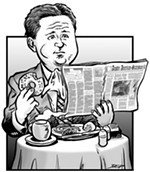Kkkjfk
Giving Hate a Microphone
By Lee Nichols, Fri., March 19, 1999
The program is titled American Dissident Voices, and its introduction describes it as a program speaking for Americans "who value quality above equality, and are willing to do whatever must be done to restore America to racial and moral health.... This is a program speaking for Americans who dissent from the United States government's policies of multiculturalism and enforced diversity and globalism. This program is the voice of America's dissidents, who are speaking out to America's patriots, and to patriots of our Western civilization around the world -- "
On the night I tuned in (March 6), the speaker was identified as Dr. William Pierce, the chairman of the National Alliance, "the world's foremost organization working for the long-term interests of white Americans, and people of European ancestry, wherever they may live."
Pierce ranted about the trial of John King, who was convicted in the dragging death of James Byrd in Jasper, Texas. While Pierce condemned Byrd's brutal murder (but not the bigotry that inspired it) as "hooliganism," he claims that what made King a racist "was not indoctrination by white gangs, [but] direct contact with the reality of the black nature. It was direct exposure to the wonders of life with the colored brother."
Pierce said he grew up in East Texas, where he said "there are, of course, too many blacks there ... but in the small towns like Jasper, the blacks are moderately well-behaved. The police don't coddle them the way they do in big cities. The white people in East Texas aren't terrorized by them.
"And so, John King didn't think much about blacks or about the racial situation in this country until he was sent to prison for burglary and was exposed to a majority prison population consisting of black criminals like James Byrd, the black ex-convict he was convicted of killing.
"I don't want to get into all of the gory details about what young white men are exposed to in prisons these days, where the majority of the inmates very often are black. It is a hell almost beyond imagining for white Americans brought up in a genteel environment. For blacks, homosexual rape is accepted behavior. It is not a rare occurrence. It is routine. It's the way they establish their barnyard pecking order. They rape each other when they must, but they much prefer to rape whites."
Yes, folks, this is what KJFK finds to fill its airwaves.
No one at the station seemed to be too anxious to take credit for the broadcasts. Operations Director Brian Billeck said the contract with National Vanguard Publishing, which distributes the program, "was set up between a former sales manager and the former general manager." He didn't name the former sales manager except to say he or she no longer worked at KJFK. The former GM is Mark Keister, who resigned about two months ago to work for the Austin YMCA as its director of financial development.
"We didn't really pick it up," Keister says. "It was a sales lead. They contacted us, and they wanted to buy time. We talked about it and said we'd give it a try."
Sadly, both Billeck and Keister gave "Media Clips" the following lame excuse: "The short of it is that as a station that strives to be the First Amendment at its best, we don't want to censor programming," Billeck says. "It's a paid spot. If you believe in the First Amendment, you believe that people have a right to voice their opinions. That's not to say I endorse the content of the programming or believe in the programming."
"After the first couple of shows, we said we needed a disclaimer," says Keister. "But ... 'The First Amendment at Its Best' means you have to be accessible to everybody."
The First Amendment at its best, if that's what KJFK really aims to be, is intelligent, meaningful discussions that enlighten the listener -- something which very little of KJFK's programming currently does. Most of what they air is mind-numbing, if not offensive. The First Amendment was crafted to elevate our nation and help it find solutions to our problems.
Yes, it also protects the rights of the offensive, but it doesn't compel broadcasters, especially private ones, to give people like Pierce a forum. If these lunatics want to vent their opinions, let them do so in the obscurity of access television or standing on the street corner handing out pamphlets.
They're Baaack
Congratulations to KOOP radio for getting back on the air Friday morning. (In case you missed it, KOOP was forced off the air for three days last week; see last week's "Naked City.") The station worked out a deal with Southwestern Bell to get reconnected via phone lines to its broadcasting tower; also, because station manager Marcelo Tafoya is also a radio engineer, they solved the problem of replacing engineer Jerry Chamkis.
That said, I'm still not convinced that this return to the air will last, although I certainly hope I'm wrong.
No doubt, if the community-owned, cooperatively run station goes off the air permanently, plenty of blame will be thrown around. Some will point the finger at the Friends of KOOP, who rebelled against an overly politically correct "Cadre" which had taken over station leadership. Some will say that the lawsuit that Chamkis and station member Michael Zakes filed against the Cadre bankrupted the station. Some will blame fiscal mismanagement, with accusations flying at both the current and previous leadership. But all of those things are merely symptoms of the real disease: crushed staff morale. And the blame for that must be firmly placed on the Cadre.
For the sake of argument, we'll brush aside the allegations of questionable elections and assume the Cadre really did rise to power through the will of the majority of KOOP members. When that happened, however, they made a crucial mistake: They forgot that KOOP was, as its name implies, a cooperative. They started acting as though they now ruled a winner-take-all democracy. They didn't make suggestions for a new direction for KOOP, they made pronouncements. And then, when some members raised legitimate objections, they tried to stifle this dissent through intimidation -- rather than contemplate the concerns of members, they berated those concerns as being motivated by racism, sexism, and homophobia. They told people to "quit whining." They said that the dissenters just feared change.
The message was: Accept our decisions, and if you don't, we'll tar and feather you.
There is just one problem with that: Unlike the democracy of a nation, a cooperative is not a winner-take-all situation. In a nation, those who come up on the losing end have to just take it. They can protest against laws they don't like, but ultimately, they must submit to them until they regain the majority.
But in a cooperative, people have a choice. If they want, they can tolerate an oppressive majority -- and for a long time now, many KOOP members have -- but they can also decide that they are tired of the abuse, they are tired of being taken for granted, and they can just pack it up and leave. And when they go, they take their labor, their resources, and most importantly, their enthusiasm with them. This is what Chamkis did. This is what the recently resigned assistant station manager Ellen Stader did. They were not the first, and even if KOOP gets back on the air, I predict they won't be the last. When these people who built the station leave, who will be left to run it?
The following statement ought to be obvious, but for the benefit of the Cadre, I'll point it out anyway: The key to a cooperative is cooperation. Even if your side "wins," you still must cooperate with the minority and come to a consensus that is at least satisfactory, if not perfect, for all. In a cooperative, you can't just push people around and expect them to mutely take it. You have to treat them with respect.
But somehow, I'm guessing that I'm just wasting ink. The Cadre have never once considered the possibility that they might be wrong, or that good people might be able to disagree. They don't have to -- they have The Truth on their side, don't they?
Got something to say on the subject? Send a letter to the editor.








